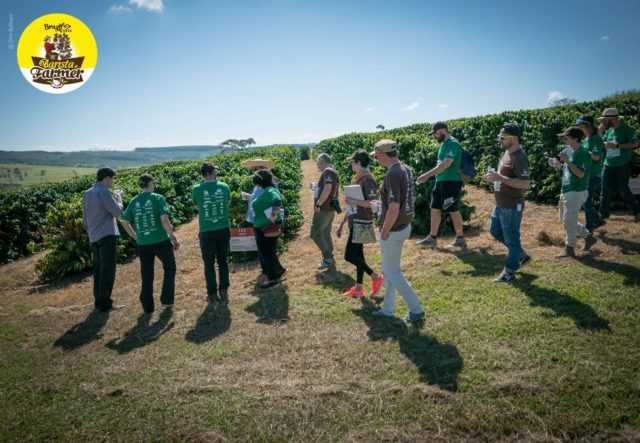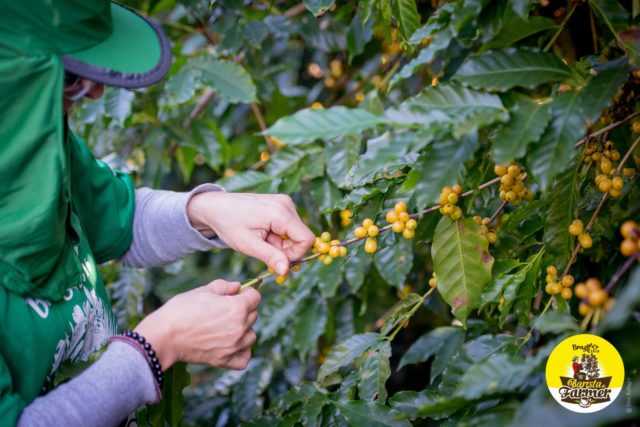RIMINI – The active involvment of institutional partners, aimed to strengthen the connection between the countries of origin and the entire coffee production chain – focusing on values such as education and sustainability – and an experimental Academy attended by ten among the best baristas in the world who will experience the life of a coffee producer in a country of origin, challenging themselves over practical tests while learning the secrets of cutting edge production techniques, up until the creation – for the first time ever – of a unique custom blend.
These are some of the novelties of the 2018 edition of “Barista & Farmer”, the only international talent show dedicated to the promotion and the culture of specialty coffee – from the bean to the cup – whose fourth edition will take place from the 3rd to the 13th of May in Colombia, the third country in the world for coffee production.
Barista & Farmer is created by Francesco Sanapo in collaboration with Italian Exhibition Group, and Sigep – Salone Internazionale Gelateria, Pasticceria, Panificazione Artigianale e Caffè, with the patronage of Sca, Specialty Coffee Association, with institutional partners Iila Istituto Italo-Latino Americano and Sena – Servicio Nacional de Aprendizaje (National Learning Service), in collaboration with World Coffee Events. Main Sponsor Lavazza. Supported by La Cimbali, Faema, Mumac Academy, Urnex and Genovese Coffee; golden media partner Barista Magazine and BarGiornale.
The new edition of the talent adds sustainabilit to the values of “education” and “competition”, proposing itself as a cultural bridge between Colombia and Italy, between the reality of the coffee producers and the international scene. Nicole Battefeld (29 years old, from Germany), Diego Campos (27 yo, from Colombia), Iuliia Dziadevych (25 yo, Ukraine), Cong Yuan (23 yo, China), Matija Matijaško (26 yo, Croatia), Daniel Munari (32 yo, dal Brazil), Sara Ricci (28 yo Italy), Vala Stefansdottir (30 yo, Iceland), Victoria Rovenskaya (26 yo, dalla Russia): these are the the nine baristas, selected among more than 250 applications who, along with the tenth participant (who will be revealed at Melbourne International Coffee Expo (MICE) in march 2018), will be committed in a complete training course, from the picking in the plantation, through all the steps of the coffee production, using different technologies, up to the tasting experience and the multiple consumption opportunities. Work and learning will be interspersed with opportunities for fun and relaxation, with themed games and competitions. The finalists will be filmed and the videos will be broadcast on www.baristafarmer.com and the talent show’s social networks.
Among the confirmed places that will host the talent, there are Meta, one of the 32 departments of Colombia. Here, the Lavazza Foundation is promoting sustainability projects aimed at the community of producers and their families, for a total of 350 people working with coffee. Huila is another region that will witness the arrival of the international baristas: its lands were once controlled by the cocaine producers, but now they have been freed by the colombian government and donated to small local coffee producers.
Colombia – 2017 production data
With an export between november 2016 and october 2017 equal to 13.4 millions of green coffee bags (+8,3% compared to the same time frame the previous year, following the recent data elaborated by the Italian Coffee Committee – source Istat/International Coffee Organization), Colombia confirms its status as the third coffee exporter in the world after Brazil and Vietnam, still playing a pivotal role among the international scenario of coffee production for both the excellent quality of its prime materials and for the small communities of producers who cultivate it with great dedication and passion, often with traditional, high quality, techniques. The import in Italy of green colombian coffee is equal to 261.906 bags in the january-september 2017 time period.
Following the data released in december 2017 by the Federacion Nacional de Cafeteros de Colombia, founded in 1927 to support work and development of the producers, a third of the population (around the 33%) residing in rural zones depends over revenues coming from coffee: 726 thousand direct workers and 1.4 millions indirect workers, representing the 32% of the agricultural laborers.
Coffee is responsible for the 17% of the agricultural GDP: besides being the third coffee producer in the world, Colombia is in first place for the Arabica washed variety (14 millions bags per year), which is particularly appreciated for its high quality. The colombian producers are more than 555 thousand, 684 thousand are the farms, for a coffee cultivated area equal to 931 thousand hectares: the vast majority of the farmers (96%) possess less than 5 hectares of land.
In Colombia the Giuseppe and Pericle Lavazza Foundation sustain, in the municipalities of Mesetas, Lejanias and San Juan de Arama, important sustainability projects to provide to the coffee growers all the tools necessary to manage the effects of the climate change and to reintegrate the families of the producers within the territories that, in the last decades, have been locations of the FARC conflict.
At Sigep, Lavazza introduced for the first time the new blend Lavazza iTierra! Colombia which broadens the premium iTierra! Line, defined by its sustainable taste and quality, and that is produced by agricultural companies which are certified by the Rainforest Alliance, where production excellence, respect for the environment and social consciousness all come together. Lavazza iTierra! Colombia is a 100% arabica blend coming esclusively from colombian cultivations and that will be available for the general public during the fall of 2018.
Barista & Farmer Academy – the novelties
The ten competitors will attend the Barista & Farmer Academy, a multidisciplinary school, under the direction of Alberto Polojac, Q Grader and member of the SCA “Sustainability Council” and of many teachers with an international cultural background, starting from the educational modules of the Coffee Skills Program by SCA and beyond, exploring subjects such as botany, agronomy and up to the extraction methods.
The baristas will partake in coffee picking in the several fincas in order to create a personal blend, while learning all the steps of the production process that takes to the final result in the cup.
This will be for them a real “marathon” where it will be possible to experiment with alternative processing methods besides the more common ones such as the natural process, the washed one and the honey processed. Alternative methods that are “borrowed” from the worlds of beer and wine, for example the use of fermentation with yeast or the seasoning with different herbs, and even the double fermentation.
“We want to create real ambassadors of specialty coffee, this is why we are going to implement the Coffee Diploma with technical aspects and practical interactive tests on the field, over new cultivation methods and agricultural practices. These ten baristas will live – even compared to the previous editions of the talent – a more elastic and integrated experience, they will be able to understand the daily work in a country of origin and most importantly, they will become coffee sommeliers. By completing the barista figure 360 degrees, we will have experts who will able to raise the bar of the coffee product in the world” said the organizers. “We will try experimental methods and maybe a brand new will come out right from Barista & Farmer”, they concluded.


















